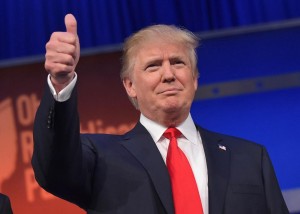 So Donald Trump, the Republican Party’s front runner for presidential nominee, wants to be “neutral” in the Israeli-Palestinian conflict, in order to negotiate a solution. No, wait. He has actually declared his “pro-Israel” credentials, but “would like to have the other side think I am at least somewhat neutral to them”. All for the purposes of doing, in Trump’s favourite word, “a deal”.
So Donald Trump, the Republican Party’s front runner for presidential nominee, wants to be “neutral” in the Israeli-Palestinian conflict, in order to negotiate a solution. No, wait. He has actually declared his “pro-Israel” credentials, but “would like to have the other side think I am at least somewhat neutral to them”. All for the purposes of doing, in Trump’s favourite word, “a deal”.
This is as good as it gets on the Palestinian issue in the bizarre reality television show that the 2016 Republican campaign has become. Trump’s desire to hoodwink the Palestinians into a peaceful resolution may be this election season’s most honest statement of purpose on the subject. Assuming, of course, that Trump, an uninformed, nativist, insular bigot on most domestic and foreign policy issues, really means what he says. He probably doesn’t, which merely adds to the Alice in Wonderland absurdity of making a supposedly secret promise of pro-Israeli pretend neutrality on live national television.
And yet, the astonishing truth may be as follows: in America’s quadrennial ritual of democracy, Trump is one of the few, if not the only Republican candidate to have placed even a notional distance between himself and the state of Israel. Unsurprisingly, he has set off alarm bells in Tel Aviv. Even the left-leaning Haaretz has carried a somewhat hand-wringing opinion piece by correspondent Chemi Shalev. It described Trump’s alleged “decimation of the three legs of blanket Republican support for Israel — Evangelicals, Jews and interventionist hawks”.
This is sound analysis in Haaretz, Israel’s oldest daily paper. Trump, who has voiced Muslim-hating and race-baiting views, is a wild card on Israel, refusing to toe the Republican Party’s traditional line even as his three party rivals either declare antipathy towards Palestinian actions and intentions or an unqualified bias towards Tel Aviv.
Earlier in March, US Senator Ted Cruz of Texas spoke of the death of a resident of his state at the hands of a Palestinian assailant and affirmed “I will not be neutral (if I am president)”. US Senator Marco Rubio of Florida said the Palestinians had failed to provide a realistic partner to talk peace with Israel, doubtfully adding that perhaps there might be a “deal in 30 years”. And Ohio Governor John Kasich presented the forlorn view that there could never be “any long-term, permanent peace solution” and all that any American president could do was to supply Israelis with “the weapons, the security they need (and) our 100% backing”.
Being pro-Israel is, of course, the traditional position for Republicans seeking office, preferment or merely to fit in with party’s most hawkish, neo-conservative elements, as well as the religious right. But the lack of enthusiasm among three of the four Republican candidates for reassessing the Palestinian issue may say something rather deep and unpleasant about their party. It may also indicate a larger policy vacuum within the American establishment as a whole towards one of the longest running and most emotive conflicts in modern times.
There are differing views on why stasis set in across the 16-year period since Bill Clinton brought Ehud Barak and Yasser Arafat to Camp David to try to end the conflict. Was it brought on by exhaustion from trying too hard without tangible result? Did 9/11 skew the equation against the mainly Muslim Palestinians, allowing Israel to fight resistance as part of the so-called war on terror? Or is it that the Middle East has become gridlocked in a way that precludes the Americans credibly offering themselves as brokers or even as well-meaning benefactors?
This is why Trump’s attempt to be seen as both pro-Israel and neutral sounds refreshing — and terribly hollow. “There’s nobody on this stage that’s more pro-Israel than I am,” Trump said at the March 10th Republican candidates’ debate, adding: “I happen to have a son-in-law and daughter who are Jewish.”
There is no sign that Israelis — or their backers in America — are taking much comfort in that. As Shalev dolefully pointed out in Haaretz, “it’s not as if Trump is really anti- Israel; hardly. Like in most other complex policy issues on which he has spoken, Trump is mainly incoherent, improvising as he goes along, shooting from the lip, saying one thing one day and the opposite the next.” The problem, he said, is that “Trump refuses to acknowledge United Jerusalem (and) wants to remain ‘neutral’…”
Neutral. There’s that word again. Perhaps there is a neutrality of a sort in a populist presidential hopeful who excites animosity both among Arab Muslims and Jews.
Trump is an equal opportunity offender.

